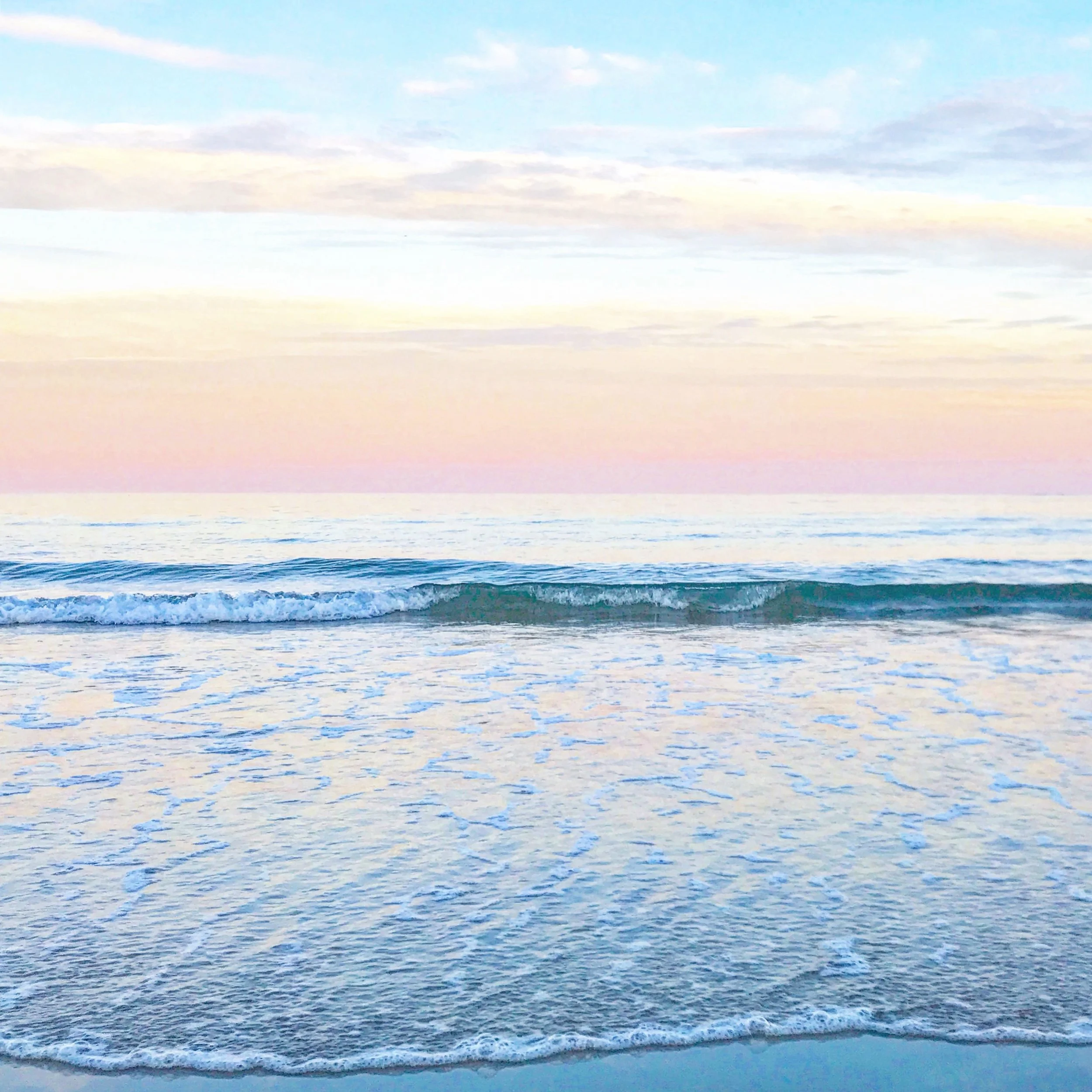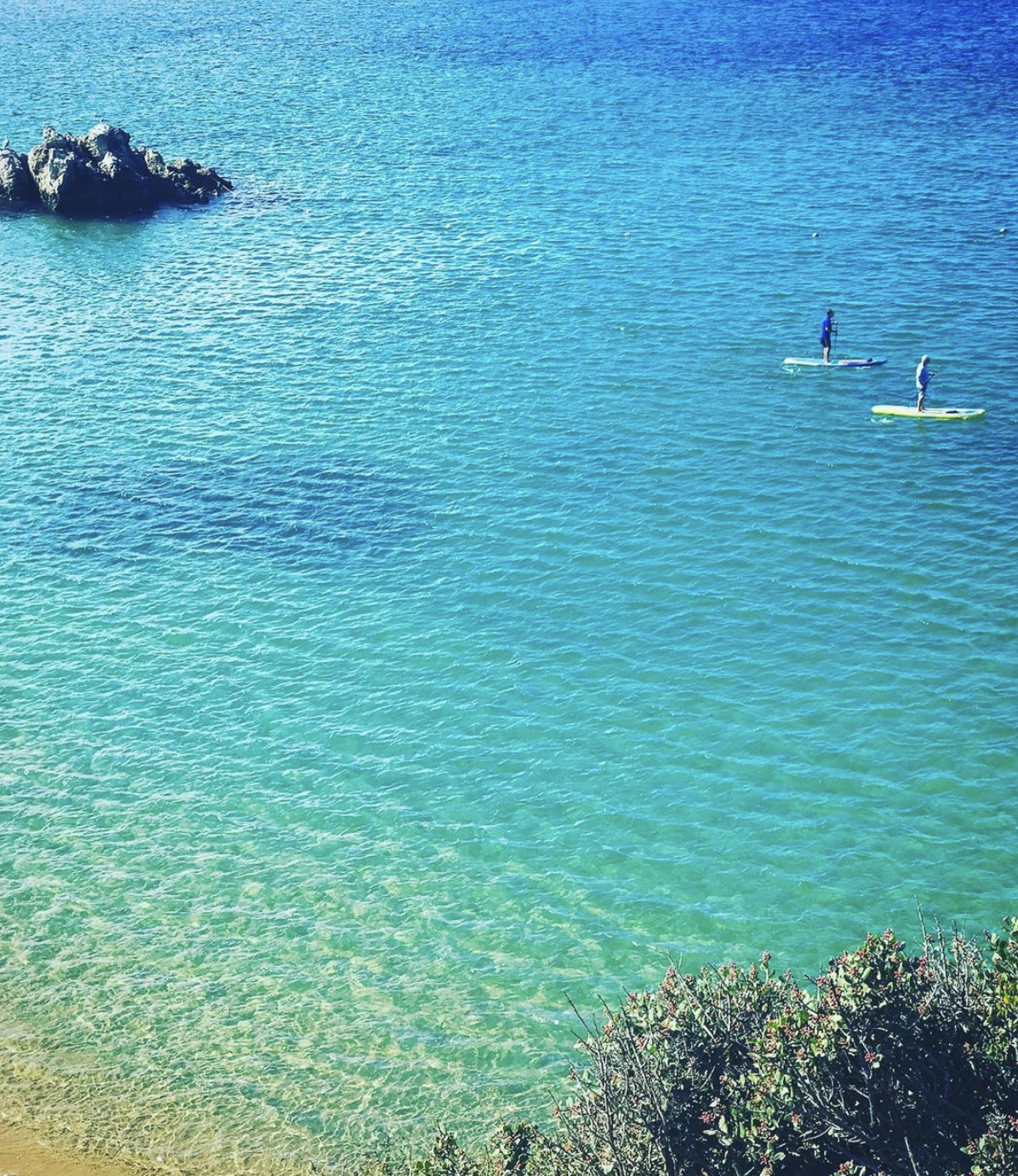“Have you also learned that secret from the river; that there is no such thing as time? That the river is everywhere at the same time, at the source and at the mouth, at the waterfall, at the ferry, at the current, in the ocean and in the mountains, everywhere and that the present only exists for it, not the shadow of the past nor the shadow of the future.” ― Hermann Hesse, Siddhartha
Water is a source of inspiration, wonder, and awe. Many of us love being around, near, or in the water. Creeks, rivers, hot springs, lakes, oceans—bodies of water draw us in. We love to experience the healing and transformative properties of life aquatic and there are many water-based activities that enhance our buoyant time. For many, these activities are profound and spiritual.
Symbolically, there are many meanings applied to water. Water is in constant motion, reminding us to go with the flow, to embrace flexibility, to float. It can be still or rough, ebbing and flowing in harmony with the greater rhythms of nature—the tides, lunar cycles, weather patterns. It is a core part of our lives and who we are, literally. Water influences us in many ways, including mood and well-being. How does water impact our mental health?
Water and Well-Being
There are many ways that water influences the brain, mood, and overall well-being. Water-based activities and aquatic sports bring the full body into the moment, invigorating numerous systems at once. What’s more, these experiences are at times powerful and healing modalities. There are lots of clichés about these endeavors. Surfing can generate the stoke, rafting brings everyone together, fly-fishing nourishes observation and patience. These tropes may be common but they’re often true. Water practices elevate our awareness and ignite expanded perspective—be it river surfing, SUP, sailing, diving, snorkeling—the list goes on. These sports in and around the water challenge us to show up in the here and now, applying skills, developing our abilities, and expanding our capacity. In addition, we each find the stroke that works for us—some love being on the river, others prefer ocean waves. Once we find the stoke, we have a lifelong passion to pursue. These activities are joyful, challenge us, and feed the spirit. But what is actually happening to us physiologically, emotionally, and even spiritually? Here’s what the science reveals about how water impacts our well-being and mental health.
Negative Ions, Water, and Mood
When immersed in water, human physiology is directly influenced. The science is somewhat limited but there are a few studies related to the effects. Negative ions are molecules that are electrically charged. Some examples include anywhere water collides—ocean, river, waterfall. One review notes positive results specific to those suffering with depression, but advises further research. Another review of ionization literature performed in 2018 states that the evidence shows that water molecules can ameliorate symptoms of depression and anxiety, potentially improve cognitive capacity, and aide in mood regulation and stress management. Natural sources are ideal and when outside we can potentially reap the benefits through activities in the rain, time in the ocean waves, swimming in natural bodies of water, or in whitewater settings where water is colliding with itself. Deeper research is needed to truly understand the deeper implications. What we know through direct experience is that movement and exercise in water can generate immediate outcomes.
Water and Mental Health: The Science
One study, directly links feelings of happiness and overall health to natural environments. The detailed data collection tracks 20,000+ participants and the findings are clear that most “are significantly and substantially happier outdoors in all green or natural habitat types than they are in urban environments.” Specifically, proximity to coastal or marine regions rates higher in terms of mental health, including even simply being able to see the water, regardless of how near or far. Another study conducted in the UK reveals that those with coastal access reflected indicators of better health and mindset, compared with those inland. This analysis notes those living closer to the sea potentially experience greater opportunities for stress reduction and activity, which improves one’s disposition.
“I’ve always lived close to the water. As a longtime whitewater paddler, and now as a surfer, the river is my church. It’s where I reignited my passion for living, pure and simple. More than this, it’s where I found a new sense of belonging. Nature has always been a very important component of my recovery and water, in particular, is where I find peace and true joy. River bliss is the only high I seek, today.”—Tim Walsh, Founder of Adventure Recovery
Surf Therapy as an Evidence-Based Practice
Surfing, in particular, has shown very positive results in relation to mental health. It is a sport that is venerated around the world. Research from 2010, also initiated in the UK, analysed individuals experiencing mental health symptoms, such as depression, anxiety, and even schizophrenia before and after surf sessions. Mood improved and subjects note increased feelings of capacity and self-esteem. Another body of research gathered at the University of California, San Francisco, measures 100 surfers and their responses to traditional psychological questionnaires related to anxiety and coping mechanisms and the results were significantly decreased mental health symptoms.
“Surfers qualitatively describe the surfing sensation as a hybrid of meditative and athletic experience. Numerous empirical studies link both meditative experience and exercise with reduced incidence of depression and anxiety; this potentially suggests that surfers may endorse fewer symptoms of either disorder…Results indicate that surfers reported significantly fewer symptoms of depression and anxiety, and employed emotion-based coping responses to stressful situations significantly less than the general populace.”—Benjamin J. Levin + Jim Taylor, Journal of Clinical Sport Psychology
Surf therapy has gained prominence as an evidence-based practice, with studies being conducted around the world on the mental health benefits of surfing. What we know is the dynamic experience of stepping away from our day-to-day lives, getting out into nature, and immersing ourselves in a full-body activity can be highly impactful and create lifelong affinity for such activities.
Mental Health + Water Sports
Whitewater rafting also receives attention from scholars. A rafting study from UC Berkley measures the impact of the activity on veterans suffering with PTSD and high-risk teens. The findings are fascinating, demonstrating that stress hormones, in the right context, can be beneficial to us. The researchers note that higher levels of cortisol correlated with increased positive emotions following river rafting generate transformative results. Participants reveal the activity elevates feelings and positivity regarding the experience. We navigate the arc of perhaps anticipating, then participating in a high-impact activity which stimulates and activates our neurons, releasing cortisol, and other potentially happy hormones as we work together to overcome, and the result benefits our sense of self-regard, our capability, and builds a foundation of resilience and adaptability.
“It’s an adaptive hormone. When we sit in front of computers being stressed out, cortisol doesn’t help us…But when we’re out in nature and we need more energy to achieve something physically demanding, cortisol goes up in a good way.”—Craig Anderson, post-doctoral fellow at UC Berkley
WATCH: River Rafting & Mental Health
Time outdoors, specifically whitewater rafting has positive mental health benefits, says UC Berkley research team
How Water Affects Us
There are some obvious reasons why one’s well-being could be positively impacted by proximity to water. Typically, near bodies of water, the air quality is higher, with less pollution, especially, and more obviously, in natural environments. Of course, there is the natural beauty factor—us humans love a good view. In addition, folks tend to move more, exercising in and around the water. Blue spaces have a specific impact, differing from green spaces.
Water is intimately tied to our well-being. We need it to survive and without it, we don’t last more than three days. Our bodies are approximately 60% water, hence the element is a core component of our experience. Historically, it has played a massive part in cultural development and evolution. Intrinsically, we are informed by this evolutionary cycle and it makes sense that the impact of water is profound and, at times, hard to put into words.
There are many articles and studies related to water, and to better understand what some now refer to as “blue mind”, and how it works. The term was coined by Dr. Wallace J. Nichols bestselling book, Blue Mind, which tracks the latest neuroscience and research, including personal stories from athletes and scientists related to water. Wallace is a marine biologist who’s background in ecology, conservation, and cognition gives him a unique perspective. His work shows how “proximity to water can improve performance, increase calm, diminish anxiety, and increase professional success. related to the effects on humans of water in its many forms.”
“Most communities are built near bodies of water not just for practical reasons, but because as humans, we’re naturally drawn to blue space…but even if you aren’t in an area where there is easy access to water, you can still experience [its] emotional benefits.”—Wallace Nichols, author of Blue Mind, 2014
Negative Ions, Water, and Mood
When we are immersed in water experiences, our physiology is impacted directly. The science is somewhat limited but there are a few studies related to this action. Negative ions are molecules that are electrically charged. Some examples include anywhere water collides—ocean, river, waterfall. One review notes positive results specific to those suffering with depression, but advises further research. Another review of ionization literature performed in 2018 states that the evidence shows the molecules can ameliorate symptoms of depression and anxiety, potentially improve cognitive capacity, and aide in mood regulation and stress management. Natural sources are ideal and when outside we can potentially reap the benefits through activities in the rain, time in the ocean waves, or in whitewater settings where water is colliding with itself. Deeper research is needed to truly understand the deeper implications. What we know through direct experience is that exercise in water can generate immediate outcomes.
Why Water + Mental Health Recovery
Beyond the research and scientific findings, water can teach us much about healing, recovery, and mental health. Do we experience contentment when we fight against the current? Or do we find peace when we go with the flow? If we flip our kayak and find ourselves underwater, does panic help? in fact, it’s here that we learn we need to tap into inner calm to achieve. This is when we learn that we are actually ok, even during a scenario that triggers our fears. Creating calm gives us time to think, get ourselves in the right position to roll, and then reorient the boat. Even in the most challenging, uncomfortable situations we can pause, remember we got this, and take the next right action.
Activity in and around water can lead to physical, psychological, and spiritual benefits and supports a healthy lifestyle. We experience positive results when we move our bodies, challenging ourselves, in water. Consequently, water can heighten mood, and generate elevated emotional states, and benefit one’s sense of overall well-being. This is why we seek the water. For many of us, it is the medicine.






